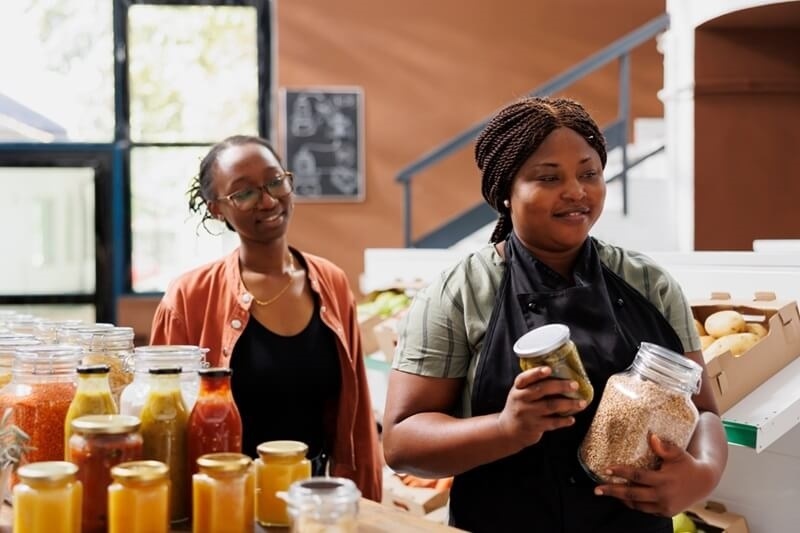
African foods are famous for their robust flavors, intense spices, and healthy staples. Each ingredient has its cultural meaning and taste - cereals such as millet and sorghum, bountiful African herbs, and hot condiments. While food is central to the African experience, the food has to be stored correctly to protect freshness, flavor, and quality. Properly storing African Ingredients can save the consumer money and keep African pantry foods fresh for a more extended period, whether preserving an African cuisine ingredient, understanding how to store African spices, or mastering African herbs storage hacks. These African food kitchen hacks will revolutionize the way you organize your pantry.
African food is as much about the quality of ingredients as it is about the recipe itself. Properly storing ingredients for African Cuisine can be the difference between a dish that explodes with authentic flavor and a flop. Dried beans, cassava flour, plantains, and spices are some of the pantry staples in many African diets that can lose their strength when not treated carefully. Understanding how to store African herbs, grains, and spices means you save their cultural identity and do not waste them.
The following sections provide practical approaches, expert-approved tips on storing African herbs, and kitchen hacks African food lovers swear by.

African cuisine depends on a combination of dried staples, fresh vegetables and fruits, and cured foods. These are the most popular African pantry staples and how they should be stored:
African spices such as berbere, suya spice, and peri-peri quickly become ineffective if subjected to moisture.
Spices are the linchpin of African cuisine. Without spices, food loses its flavor. Knowing how to store African spices is vital if you always desire an authentic taste.
These kitchen hacks, used by African food enthusiasts, will keep flavors intact, whether you’re cooking jollof rice, pepper soup, or Moroccan tagine.
Preserving African cooking ingredients goes beyond storage—it is about maintaining culture. For generations, food preservation has partly meant relying on natural methods that protect and enhance natural flavor.
These steps have become both a cultural tradition and a practical requirement for preserving African cooking ingredients.
African herbs like moringa, scent leaves, and African basil provide unparalleled freshness to any dish. But they go bad instantly if not stored properly. Here are some African herbs storage tips that you need to know:
These African herbs storage tips help keep your herbs for weeks rather than days.
For the African food lover who loves to cook, cooking African food can be challenging for various reasons, such as the availability of ingredients or the storage space. That's where kitchen hacks for the popular African food lovers come to light:
These kitchen hacks can save time and reduce waste for those passionate about African foods, especially for busy families.
Storing African Ingredients isn't merely about extending shelf life but preserving authenticity. Most African meals rely on the pungency of flavor. Stale spices or herbs that have lost their fragrance mean the meal loses its essence.
Additionally, smart storage avoids unnecessary costs. Preserving African cooking ingredients ensures you don't have to replace rotten foodstuffs. With accurate African herb storage tips, you can prepare meals that always taste fresh.
Learning the art of storing African Ingredients is an investment in flavor, culture, and well-being. From discovering how to store African spices to implementing African herb storage advice and other kitchen tips African food lovers suggest, the rewards are limitless. You save flavor, avoid waste, and keep African pantry staples authentic.
Whether you are a novice in African cooking or a seasoned home cook, these strategies ensure your ingredients stay as lively as the recipes they inspire.
1. What is the optimal way to store African spices for freshness?
The recommended way to store African spices is in airtight glass jars protected from moisture and sunlight. Additionally, it is preferred to purchase whole spices and grind them as needed for freshness.
2. What are the primary African pantry essentials?
Some primary African pantry essentials are grains—such as millet and sorghum—cassava flour, palm oil, beans, dried fish, and an extensive range of spices like berbere and suya.
3. How can African cooking ingredients be preserved without refrigeration?
Sun-drying, fermenting, and pickling naturally preserve African cooking ingredients. These traditional methods ensure that food is kept safe and flavorful for longer periods of time.
4. What are some best practices for storing African herbs?
For instance, fresh herbs like moringa or basil should be wrapped in a damp paper towel and kept refrigerated. Dried herbs should be stored in airtight jars. Chopped herbs can be stored in oil as cubes before freezing.
This content was created by AI